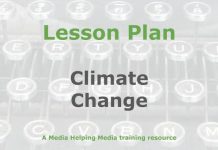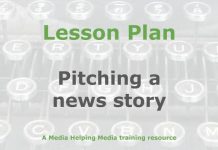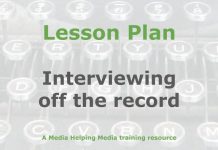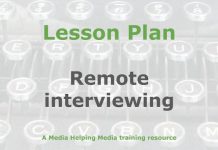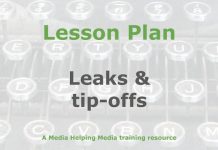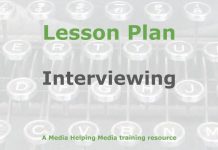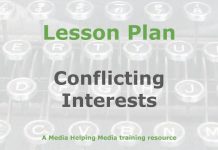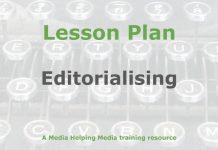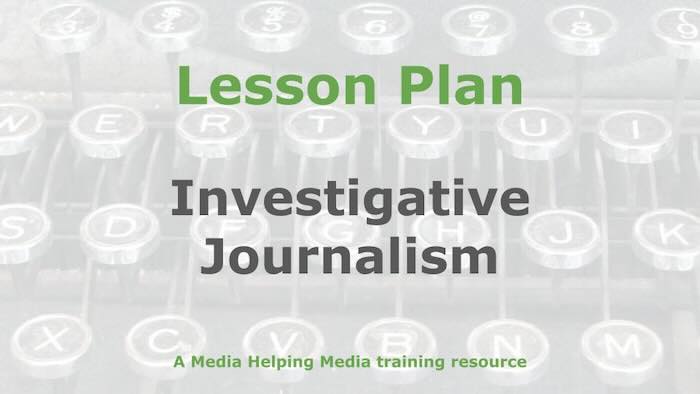 This lesson plan is designed to help journalists avoid the common traps and obstacles when undertaking a thorough and intricate investigation.
This lesson plan is designed to help journalists avoid the common traps and obstacles when undertaking a thorough and intricate investigation.
It’s based on the article ‘Investigative journalism best-practice‘ which is published on Media Helping Media. We recommend trainers read the article before adapting the lesson plan for their own requirements.
The aim of this lesson is to equip trainees with the critical skills, ethical frameworks, and practical safety protocols necessary to undertake complex investigative work to international standards, mitigating common risks and errors. The lesson is designed to be highly adaptable to various training environments and to encourage active, practical participation.
Sessions Timetable
09:00–10:00 – Session 1: Laying the foundation: research and focus
- Aims: Trainees will understand the importance of comprehensive initial research to establish focus and credibility. Trainees will learn how to identify and utilise various document and human sources effectively.
- Presentation: Trainer presents the core premise that proper research provides focus, maintains credibility, and informs interview strategy. Cover accessing official documents (laws, court records, financial reports) and using NGO/international organisation websites. Discuss the importance of looking for a new angle.
- Activity: Present the trainees with a complex hypothetical investigative topic (e.g., a local corruption case). In small groups, trainees must list five different types of documents and five types of human sources they would consult in the initial research phase.
- Discussion: rainer leads a group discussion on the balance between research depth and losing focus (“getting lost in piles of material”). How do you know when you have enough to start interviewing?
10:00–11:00 – Session 2: Sourcing, verifying, and accurate reporting
- Aims: Trainees will be able to differentiate between various types of human sources, verify their motives, and ensure the resulting report meets a standard of fairness. Trainees will learn the importance of including diverse perspectives.
- Presentation: Trainer outlines how to handle different sources: experts (checking their agenda/links to avoid bias), former officials (questioning their motives), and victims/human faces (essential for connecting the story to the audience). Emphasise the need to represent the interests of different groups, even if minor or unpleasant, to ensure a complete story.
- Activity: Provide three short case studies of sources (an academic, an NGO director, and a recently dismissed manager). Trainees identify the potential motives and inherent bias of each source and list three ways to verify the information they provide.
- Discussion: Discuss the ethical responsibility of the journalist to question and check the background of sources, especially those with political or business links.
11:00-11:15 – Break
11:15–12:45 – Session 3: Mastering the investigative interview
- Aims: Trainees will master practical interviewing techniques, including preparation, questioning styles, and documentation methods. They will learn the hierarchy of interview methods.
- Presentation: Trainer details interview best practice: In-person is always preferable. Phone is fine. Email should be a last resort (and clearly stated in the copy). Importance of dual documentation: recording and note-taking. Guide trainees on the sequence of interviews, recommending hostile or evasive subjects are left until last.
- Activity: Trainees partner up. One trainee acts as a hostile interviewee (e.g., a governmental representative) and the other practices asking open-ended questions and avoiding leading questions. Trainer monitors and provides immediate feedback on question structure (short, precise) and active listening.
- Discussion: Discuss the need to prepare a basic question list but remain flexible. Address the common mistake of thinking about the next question instead of actively listening to the current answer.
12:45–13:45 – Lunch
13:45–15:00 – Session 4: Ethical interviewing and legal compliance
- Aims: Trainees will apply critical ethics when dealing with sensitive and vulnerable individuals and understand the legal boundaries of sourcing. Trainees will ensure their reports are accurate and respect privacy.
- Presentation: Trainer covers interviewing the vulnerable (trauma victims and children): obtaining consent, finding secure places, and adjusting style (slowly, patiently, non-structured for children). Detail the “on the record” vs. “off the record” distinction and the need for informed consent. Stress the rule: never make up a quote. Discuss being sensitive to offence when reporting difficult stories.
- Activity: Consent and sensitivity role-play. Present a scenario involving a trauma victim or a minor. Trainees outline the exact steps they would take to set up and conduct the interview to ensure the safety and well-being of the subject, and how they would seek permission.
- Discussion: The law and the journalist. Discuss local laws relating to reporting (e.g., covert recording, identifying minors in court cases). Discuss the necessity of using anonymous sources sparingly and identifying them as specifically as possible (e.g., ‘senior UN official’ rather than ‘diplomat’).
15:00-15:15 – Break
15:15–16:15 – Session 5: Managing risk and undercover reporting
- Aims: Trainees will be able to implement essential safety and security measures. Trainees will analyse the high-level ethical decision-making required for going undercover, safeguarding their integrity.
- Presentation: Trainer outlines safety protocols: carrying ID, having emergency contacts, using secure storage for sensitive files, and being cautious with mobile telephones and email (sensitive conversations should be face-to-face). Detail the criteria for deciding to go undercover: Is it of vital public interest? Does public value outweigh deception and potential privacy violations? Have all other means been exhausted?
- Activity: Security audit and check-in plan. In groups, trainees draft a security plan for a week-long investigation in a high-risk area. This plan must include a check-in protocol with an editor, secure communication methods, and a list of necessary materials/local contacts.
- Discussion: Undercover journalism dilemma. Discuss the tension between uncovering vital public interest information and sacrificing transparency/honesty. What are the potential consequences for the journalist’s reputation and credibility?
16:15–17:00 – Session 6: Organising, writing, and conclusion
- Aims: Trainees will learn how to structure complex material effectively using an outline. They will master the elements of strong investigative writing, including word choice and narrative flow, ensuring impartiality.
- Presentation: Trainer instructs on the power of a detailed article outline (roadmap: beginning–middle–end). Emphasise that the intro must grab attention, and the conclusion must summarise the importance without introducing new information. Stress the importance of avoiding emotive words and heavily slanted adjectives (e.g., ‘vicious,’ ‘arrogant’) to maintain objectivity.
- Activity: Outline drafting and intro critique. Trainees draft a simple, three-part outline for the hypothetical corruption case from Session 1. They then write the first two sentences of the intro (the lead) and read them aloud for peer critique based on the criteria: attention-grabbing and focused.
- Discussion: Review and key takeaways. Trainer summarises the day’s learning, focusing on the simple formula: “Tell them what you are going to tell them; tell them the story; tell them you have told them.”
Assignment: The mini-investigation brief
Trainees must select a local, small-scale issue (e.g., a fault in a public service, a local regulation loophole) that requires at least two human sources and one official document to investigate. They must:
- Produce a detailed research plan, citing the specific document/records they would seek.
- Draft a question list for two different sources (e.g., an official and a ‘human face’).
- Write a detailed article outline, including the draft lead sentence, a summary of the body paragraphs, and the concluding thought.
- Submit a short reflection (300 words) analysing the ethical and safety pitfalls they identified and how they mitigated them.
Materials needed
- Handouts summarising the “on/off the record” rules and the undercover journalism public interest test.
- Example official documents (printouts or digital copies of public records/laws).
- Case studies of ethical dilemmas (for source motive checking and undercover decisions).
- Recording devices (optional, for role-play).
- Flip chart or whiteboard for group work and discussion points.
Assessment
- Participation in discussions and role-play activities.
- Quality and completeness of the research plan and question lists.
- Feasibility and structure of the article outline.
- Evidence of critical thinking and application of ethical and safety protocols in the assignment reflection.
Summary
This comprehensive day-long lesson plan focuses on equipping media trainers and their trainees with the practical skills and ethical grounding needed to conduct effective investigative journalism while deliberately avoiding the pitfalls of investigative journalism. The sessions move from rigorous research and source verification to advanced interviewing, mandatory ethical compliance, safety procedures, and finally, structured writing techniques.
